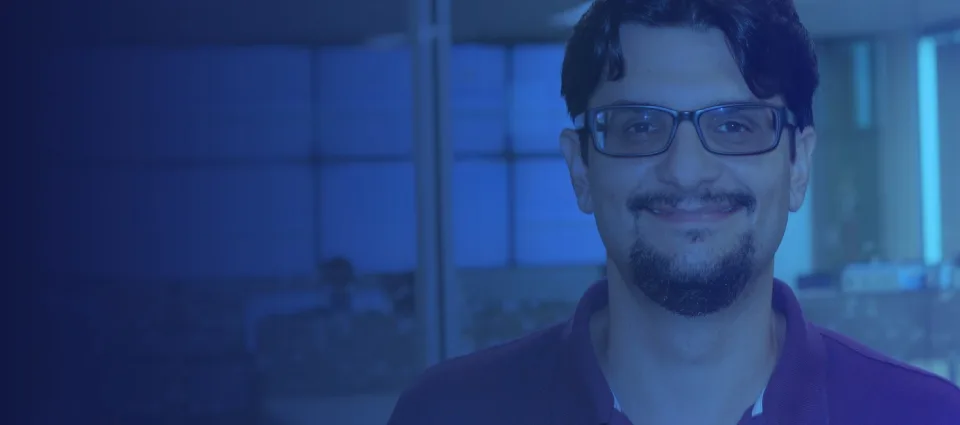Aurelia Ioniță joined Stefanini more than a decade ago, when she was offered the opportunity to take on a Support Engineer role that would allow her to attend classes for her master’s degree. Since beginning the role, she has quickly developed her Spanish and English skills, been promoted multiple times and taken on new levels of responsibility.
We caught up with Aurelia to discuss her experience at Stefanini, including the value of empathy, the importance of asking questions and why selling yourself is an important part of moving up the career ladder.
This is the thirteenth interview in our series involving our Digital Workplace Services (DWS) colleagues. DWS spans multiple roles and skillsets, with team members able to meet customers’ changing needs. These range from traditional Service Desk and Field Service to modern infrastructure capabilities, including cloud, virtualization, platforms and applications. This series explores the career journeys, best practices and learnings of DWS colleagues across EMEA and showcases what life at Stefanini involves.
Why did you choose to join Stefanini?
I’d view joining Stefanini as a mutual decision taken by me and the company. I joined during my first year of my master’s program at ASE, which was focused on International Relations and European Studies.
Stefanini was my first real job and felt like a great opportunity because it offered a very flexible schedule, allowing me to attend all of my classes.
I had a really important first interaction with the recruiter in the HR team who hired me. She was able to explain to me why working for Stefanini could be a great decision for me and was also very considerate when I experienced a difficult family situation.
My first team leader was also a great support to me and said the freedom with which I answered questions during a Spanish speaking test showed I was enjoying myself rather than feeling tense. Her support and the strong collaboration I had with my colleagues were key to me loving the role.
How have you evolved professionally within the company so far?
I started out as a Support Engineer providing assistance to customers in Spanish and English. I had 15 projects I was trained on, including a particularly challenging project with a wide range of specifications. This experience meant my language skills developed very quickly as I was constantly reading relevant documents and the knowledge base. This project also helped me to understand how to communicate more effectively, as the fairly formal way that Spanish or English is taught in school wasn’t always suitable.
I also had to quickly understand the extent to which each caller was familiar with technology and tailor my advice accordingly. As a result of this, I also improved the knowledge base as I identified new ways to troubleshoot issues more effectively. I also supported my colleagues and offered advice on how we could better help callers. This caught the attention of the client who proposed that I move to a second level position.
I’m now part of a project where we do not have direct contact with patients but with hospital staff and managers. I’m really proud of the client’s recognition, the positive surveys, and the personal relationships I built with many of the customers, which fuels my desire to continue in the role.
What are the most important things that you have learned here?
I started my role with quite an old fashioned mindset and thought that because the boss or the team leader has the best visibility of the different team members, they were best placed to decide which role a person should hold.
I’ve since learned that’s not how it works here and if you want to progress into a new role you have to speak up and sell yourself by showcasing your talents and capabilities. I still feel like properly applying this lesson is an area of development for me, but I know it is important.
However, the most important lesson I have learned is that being empathetic is no bad thing. It’s not something that makes you weak or undermines your progress. Stefanini has made me feel proud of the fact that I’m a natural empath and even invited me to train the team on empathy, which was an invitation I gladly accepted. I began my training by telling my colleagues about a difficult one-hour call I had when I was new in my role, which ended with the caller telling me they appreciated my empathy and calmness, and mentioned that he’d guessed I was new but this didn’t bother him because I’d made him feel confident that his issue would be resolved.
I’ve also learned how to prioritize my tasks and politely manage expectations, while my training skills have also improved.
What are some best practices learned and applied in your current role?
It’s important to always be polite and to smile even if you’ve had a bad day. Placing yourself or a family member in the customer’s position can be an effective approach and helped me to communicate better.
It’s important to try to always fully understand what a customer wants or expects to happen so that you can truly deliver – doing so will take you from just doing what’s expected to massively exceeding all expectations.
What do you like most about working at Stefanini?
I’d have to say the interaction with colleagues and customers, the training sessions that leave users confident and satisfied, as well as the positive surveys and the worm wishes I receive at the end of calls.
What advice would you give to a new Stefanini employee?
It’s important to always think outside the box. If there aren’t solutions in the knowledge base or the available documents, doing some desk research in order to find solutions might be necessary. Remember the knowledge base is built through your own day-to-day cases. Also, try to support the superior escalation groups rather than passing all the work up to them. Document even the minor details in the case, as this will always prove helpful.
It’s also important to not be afraid to ask questions. One manager I worked with would often say: “There are no stupid questions’’. I learned from experience that it is better to admit when you do not know something to a trainer, a knowledge specialist, a quality specialist, or even a more experienced colleague, than to go to the client with wrong information.
I was initially nervous to ask questions because I did not want my colleagues to think I was underprepared. When you don’t know something, you could potentially research and read up on the subject and gather all the information you can find, or, alternatively, you recognize there are some situations that you simply can’t tackle alone. Obviously, taking the first approach can sometimes play an important part in generating new knowledge base articles and helpful solutions.
I’d also stress the importance of thinking of a customer as if they were a family member, which I guarantee will help keep you calm during a call.
What advice would you give to other Stefanini colleagues when it comes to building a success story here?
Stay true to your ideas, never be afraid to take up challenges and be prepared to honestly assess your own efforts and where you can develop.
Want to be our next success story? At Stefanini, we’re always interested in hearing from talented candidates across all levels of experience. You can browse our current EMEA vacancies, here.



















